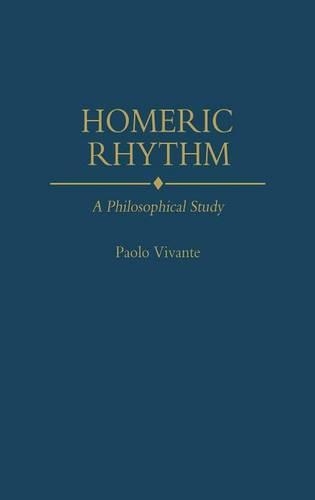
Homeric Rhythm: A Philosophical Study
(Hardback)
Publishing Details
Homeric Rhythm: A Philosophical Study
By (Author) Paolo Vivante
Bloomsbury Publishing PLC
Praeger Publishers Inc
28th October 1997
United States
Classifications
Tertiary Education
Non Fiction
Literary studies: ancient, classical and medieval
Literary studies: fiction, novelists and prose writers
883.01
Physical Properties
Hardback
176
Description
In a follow-up to his previous Homeric studies, noted classicist Paolo Vivante explores Homer's verse, highlighting rhythm rather than metre. Rhythmical qualities, he argues, constitute the force of the versefor example, in the way the words take position and in the way each pause hints suspense, producing an immediate sense of time. Vivante's main concern is not with the techniques or rules of the verse-composition, but more philosophically with verse itself as a fundamental form of human expression. This study will be of interest to both students and scholars.
Reviews
[T]his work perceptively and convincingly displays how rhythm contributes to the beauty and power of Homeric artistry.-Religious Studies Review
Discussions of Homeric metrics and formulas come nowhere near the helping of the oral reader....This book is an exception. Not only does Vivante recommend oral reading, but he delivers a profound analysis of the Homeric poem's core rhythms in such a way that today's oral interpreter can benefit....the book will be useful to all students of poetry in any language.-Phi Beta Kappa Newsletter
In addition to chapters on rhythm and meter, order of words, enjambment, and time and verse, in which Vivante systematically examines with critical insight a large number of Homeric verses in order to explain his theory of rhythm, there is a chapter on Apollonius Rhodius, a conclusion, and a valuable bibliographical essay which summarizes the work of the leading scholars of Homeric verse and versification.-International Study in Philosophy
"This work perceptively and convincingly displays how rhythm contributes to the beauty and power of Homeric artistry."-Religious Studies Review
"[T]his work perceptively and convincingly displays how rhythm contributes to the beauty and power of Homeric artistry."-Religious Studies Review
"Discussions of Homeric metrics and formulas come nowhere near the helping of the oral reader....This book is an exception. Not only does Vivante recommend oral reading, but he delivers a profound analysis of the Homeric poem's core rhythms in such a way that today's oral interpreter can benefit....the book will be useful to all students of poetry in any language."-Phi Beta Kappa Newsletter
"In addition to chapters on rhythm and meter, order of words, enjambment, and time and verse, in which Vivante systematically examines with critical insight a large number of Homeric verses in order to explain his theory of rhythm, there is a chapter on Apollonius Rhodius, a conclusion, and a valuable bibliographical essay which summarizes the work of the leading scholars of Homeric verse and versification."-International Study in Philosophy
Author Bio
PAOLO VIVANTE is Professor Emeritus of Classics at McGill University. He is the author of The Homeric Imagination, The Epithets in Homer, Homer, and The Iliad: Action as Poetry.
